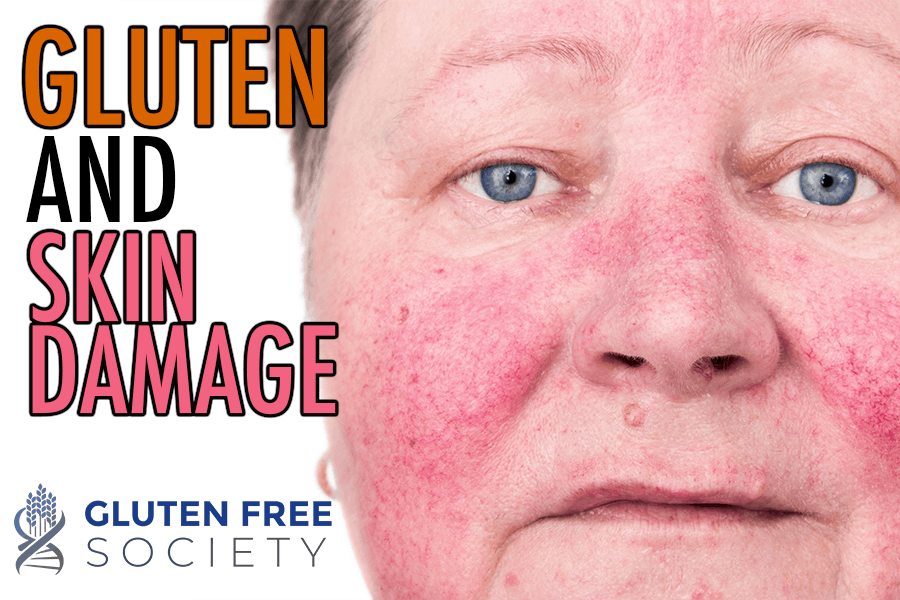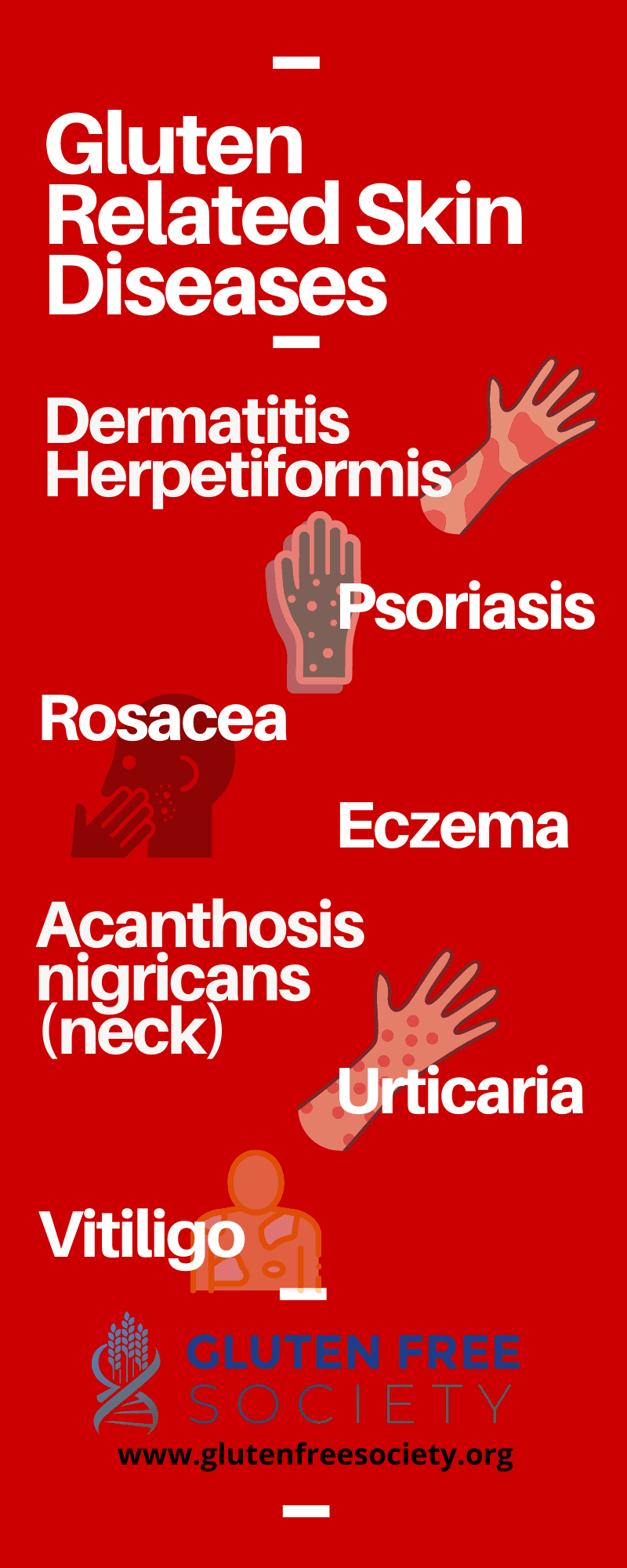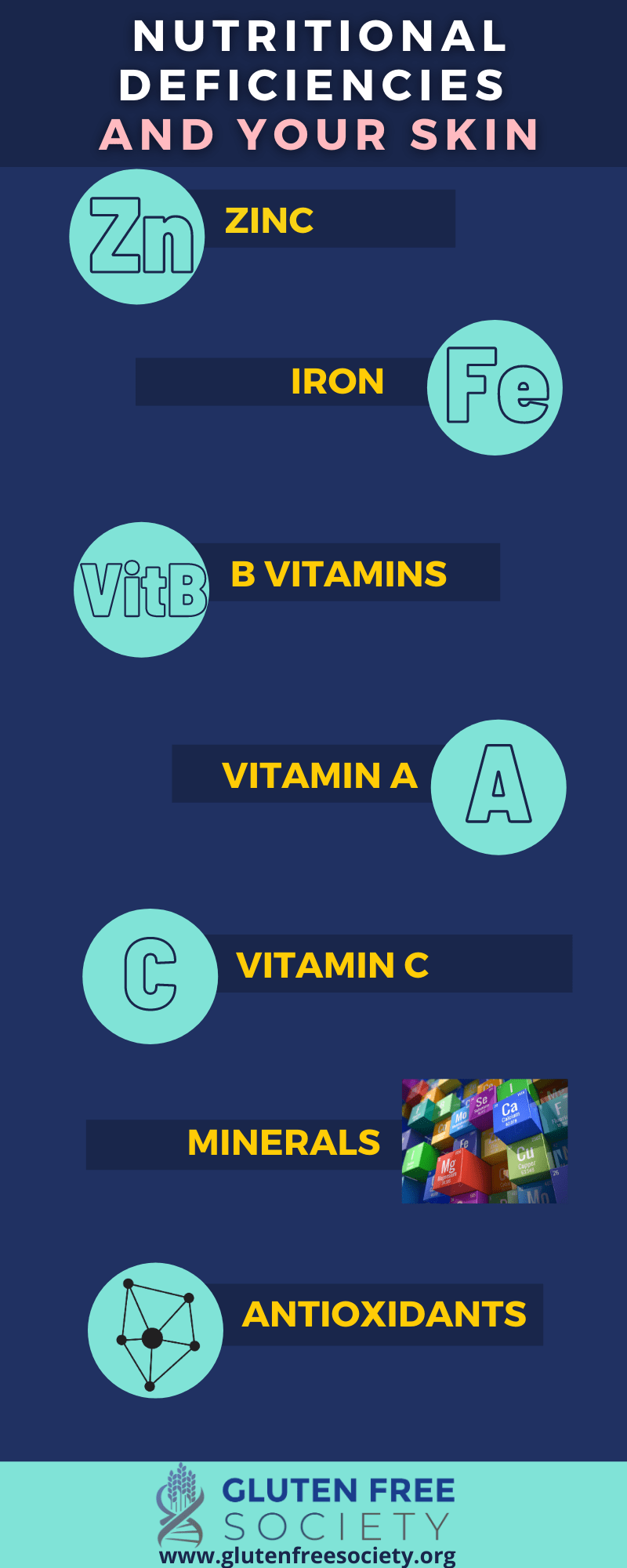Can Gluten Cause Skin Problems?
 Gluten is well-known for causing celiac disease, but can gluten cause other skin problems? Evidence that connects gluten to many other abnormalities and diseases keeps piling up. And these conditions include those that affect your skin.
Gluten is well-known for causing celiac disease, but can gluten cause other skin problems? Evidence that connects gluten to many other abnormalities and diseases keeps piling up. And these conditions include those that affect your skin.
For some, gluten causes the immune system to overreact. It causes inflammation. And it can lead to a variety of allergic and immune type reactions. Since these are also underlying factors of many skin conditions, it’s not surprising that the connection is strong.
So let’s start by taking a closer look at some of the skin conditions triggered by gluten.
Dermatitis Herpetiformis
Dermatitis herpetiformis (DH) is a rash defined by clusters of itchy bumps and blisters. And science tells us it’s a common skin manifestation of celiac disease, meaning it’s directly caused by gluten. Most experts argue that a DH diagnosis is enough to confirm celiac disease.
Gluten-sensitive individuals create antibodies against gluten. Antibodies are proteins used by your immune system to fight against foreign invaders. So when gluten is consumed, the immune system uses these anti-gluten antibodies to attack. And this immune reaction creates inflammation and damages the lining of the small intestine. But it can also trigger other immune reactions throughout the body.
With DH, gluten causes IgA antibodies to form in the skin. The antibodies lead to blister-like lesions that form on the skin.
It’s estimated that 10% of people with celiac disease are diagnosed with DH. However, up to 30% of individuals with DH do not experience the common digestive symptoms associated with celiac disease.
Nevertheless, whether you have digestive issues or not, research has proven that the best treatment for DH is a strict gluten-free diet. Plus, studies have shown that if gluten is reintroduced, DH quickly comes back.
Chronic Urticaria Celiac Disease & Gluten
Urticaria, also known as hives, is a common skin condition affecting 15 – 25% of people within their lifetime. It produces itchy pink or red bumps as well as patches of swelling.
Chronic urticaria (CU) is less common (0.5 – 1% of the population), but more debilitating since it lasts more than 6 weeks. In 30 – 50% of cases, CU is believed to be caused by an autoimmune response, which helps explain its connection to celiac disease as well as many other autoimmune conditions.
In a large population study, it was reported that celiac patients were 1.5 times more likely to develop urticaria and almost 2 times more likely to develop CU than the general population.
In this study, celiac disease was found in 5% of children with CU but only 0.67% of children without CU. The children diagnosed with celiac disease were placed on a gluten-free diet. Within 5 to 10 weeks, all cases of CU went into full remission.
Based on these findings, evidence suggests some cases of CU may also be a skin manifestation of celiac disease.
Psoriasis & Gluten
Psoriasis is an autoimmune skin disease associated with chronic inflammation. It produces patches of red, rough, and scaly skin.
The link between psoriasis and celiac disease dates back to 1971 when scientists found intestinal inflammation in a small group of people with chronic psoriasis. This connection was initially met with skepticism, but recent research demonstrates strong support for this theory.
According to this meta-analysis, psoriasis patients are 3 times more likely to develop celiac disease than those without psoriasis. Another meta-analysis found that 40 – 50% of psoriasis patients experience intestinal malabsorption, which is a well-known symptom of celiac disease that causes nutrient deficiencies.
Scientists have also reported that patients with psoriasis were almost 2.5 times more likely to have anti-gluten antibodies than those without psoriasis.
So the evidence linking gluten to psoriasis is strong. However, the exact mechanism by which eating gluten leads to psoriasis isn’t fully understood. And it may be a combination of factors.
For example, there’s often a genetic component to autoimmune disease. So some believe the connection arises because some of the genes linked to psoriasis are also linked to celiac disease.
Another theory points out that both psoriasis and celiac disease leads to the release of inflammatory compounds known as interleukins. And interleukins are responsible for triggering a specific autoimmune reaction that’s associated with both conditions. Thus, one condition may lead to the other. Or they may aggravate each other when they occur simultaneously.
One last area of study relates to vitamin D deficiency, which is common among those with gluten sensitivity. It’s also known to increase your risk of developing psoriasis.
Regardless of the exact mechanism, there’s evidence suggesting that a gluten-free diet is an effective treatment for some with psoriasis. Especially those that test positive for anti-gluten antibodies.
In this study, 33 patients with psoriasis that had anti-gluten antibodies were put on a gluten-free diet for 3 months. 73% of these patients experienced a dramatic improvement. Their psoriatic patches became smaller and less severe. Plus, within this group, 82% had lower levels of anti-gluten antibodies at the end of 3 months.
Another small study found that a gluten-free diet reduced the activity of anti-gluten antibodies in skin tissue by 50% in patients with psoriasis within 3 months.
Eczema – Strong Links to Celiac
Eczema, also known as atopic dermatitis (AD), is a chronic inflammatory skin disease that causes patches of red, leathery, and scaly skin. The inflamed skin is itchy and often painful.
There’s a lot of speculation surrounding the cause(s) of AD. Genetics, environmental triggers, and autoimmunity have all been discussed. However, while more research is needed, there does appear to be a link to gluten sensitivity and celiac disease.
In this study, scientists found that children with AD were 4 times more likely to be diagnosed with celiac disease than those without AD.
Another study found that AD was 3 times more prevalent among those with celiac disease than those without. In this same study, the researchers also discovered that AD was 2 times more likely to occur among family members than spouses, hinting at a genetic component.
Food allergies have also been associated with AD. And wheat, which contains gluten, is among the most common food allergens. Current evidence suggests that food allergies may exacerbate AD. Nevertheless, since conventional medical treatments don’t have a high success rate, many people try eliminating certain foods from their diet.
In this study, researchers surveyed 169 individuals with AD that tried excluding certain foods and ingredients from their diet as a form of treatment. The most commonly excluded foods were junk food, gluten, and dairy. However, it’s worth noting that most junk food contains gluten.
According to the survey results, the best outcomes came from eliminating white flour products, gluten, and nightshades (e.g., tomatoes, peppers, eggplant, etc.). More specifically, about 50% of people that eliminated these foods experienced a significant improvement in their condition.
It’s also worth noting that about 80% of participants also added more healthy foods to their diets, such as vegetables, fruits, and omega-3 fats. Based on the results the participants experienced after changing their diet, 93% of the group believed that doctors should discuss nutrition when addressing skin-related issues.
Rosacea & Your Gut Microbiome
Rosacea is an inflammatory skin condition that causes patches of red skin on the face. While it has been observed in men, it’s more common among women.
Rosacea shares genes that are associated with other autoimmune conditions, such as celiac disease. Plus, women with rosacea are 2 times more likely to develop celiac disease than the general population. And those with celiac disease are almost 1.5 times more likely to develop rosacea.
Other gastrointestinal conditions have also been linked to rosacea, including gut bacteria imbalances. Researchers hypothesize that an overgrowth of pathogenic bacteria may activate specific proteins in the blood that promote inflammation and lead to flushing in the face. This may help explain why antibiotics have been successfully used to treat flare-ups.
Thus, it’s important to mention that numerous studies have determined that people with celiac disease tend to have gut bacteria imbalances, including more pathogenic gut bacteria than healthy subjects.
Plus, in this animal study, gluten-containing diets reduced the diversity of bacteria in the gut. When the animals were then put on a gluten-free diet, the diversity improved. And diversity is one of the most important factors when it comes to a healthy gut microbiome.
Vitiligo, Autoimmunity, & Gluten
Vitiligo is an autoimmune condition where the immune system attacks your pigment-producing cells. Thus, it causes patches of lighter skin.
There isn’t a lot of scientific evidence demonstrating a clear link between gluten and vitiligo, but there is evidence that a gluten-free diet helps.
In this case study, a young woman with vitiligo was not responding to conventional treatment, including topical steroid medications and light therapy. On the other hand, she experienced a significant re-pigmentation of her skin shortly after starting a gluten-free diet. However, it’s worth noting that the condition did not resolve completely. After 4 months, her condition stopped improving, but it didn’t get worse.
The researchers also highlighted the fact that conventional treatments usually take at least 6 to 12 months to start working, if they work at all. Thus, in this case, they were surprised that results on a gluten-free diet were seen in as little as 2 weeks.
The was also another case report of a girl with celiac disease and vitiligo that experienced re-pigmentation after starting a gluten-free diet.

Acne, Gluten, and Diet
In this article, I discuss numerous ways in which gluten contributes to the development of acne. And there’s evidence suggesting that a gluten-free diet may help clear up your skin.
In one case study, a woman was battling severe acne. She tried antibiotics and topical treatments as well as a steroid medication. The steroid medication provided some relief, but she started experiencing unpleasant side effects, such as anxiety and blood sugar imbalances.
This woman was also given proton pump inhibitors for acid reflux, experienced prolonged menstrual cycles, and took an iron supplement for anemia. All red flags for celiac disease. And testing confirmed a vitamin D deficiency and the presence of anti-gluten antibodies.
Her doctor recommended a gluten-free diet and vitamin D supplementation. At first, she didn’t experience any relief from her acne. But her acid reflux disappeared. So she kept with the diet. After 3 months, her acne started to clear. Within 8 months, her skin was completely healed except for a few lingering scars.
A similar case was also reported of a man with chronic acne, food allergies, and digestive discomfort. Antibiotics were prescribed for his acne with no success. Lab tests revealed the presence of anti-gluten antibodies. A gluten-free diet and vitamin D supplementation were prescribed. Within 4 months the pimples on his chest, back, and arms were completely gone. Plus, he reported that his stomach felt “normal” again.
Gluten-Induced Malabsorption and Nutrient Deficiencies
Because of the damage gluten causes to the lining of the small intestine, malabsorption and nutrient deficiencies are common among those with gluten sensitivity. This is relevant because nutrient deficiencies can negatively affect your skin.
I already mentioned the link between psoriasis and vitamin D deficiency. Below are some other connections between specific nutrient deficiencies and skin conditions.
Zinc & Skin Problems
Zinc deficiency is believed to cause acquired acrodermatitis enteropathica, which looks a lot like eczema. However, diarrhea and hair loss (a.k.a. alopecia) are also common symptoms.
Zinc deficiency is also associated with slow wound healing, weeping eczema (eczema with pus-filled blisters), and acne.
Iron & Skin Problems
A lack of iron can cause dry, itchy skin as well as angular stomatitis, which causes red and swollen patches in the corners of your mouth.
Vitamin B12 and Folate
Vitamin B12 and folate deficiencies are also associated with angular stomatitis as well as hyperpigmentation, which causes darker patches of skin.
A lack of vitamin B12 is also associated with vitiligo.
Vitamin A & The Skin
Vitamin A deficiencies can cause an excess of the protein keratin to be produced in your skin, which can clog your pores and sweat glands.
Vitamin C
Scurvy is a disease caused by a vitamin C deficiency and the symptoms include scaly, dry skin as well as easy bruising and slow wound healing.
Vitamin B3
A lack of vitamin B3 can cause skin inflammation, a condition known as pellagra.
Antioxidant Vitamins and Minerals
It’s important to note that vitamins A, C, and E as well as zinc and selenium act as potent antioxidants. This means they play an important role in protecting your skin from free radical damage. Thus, deficiencies can affect the health of your skin.

Excess Carbs and Skin Disease
Most gluten-containing foods are packed with quickly digested starch and sugar. So when consumed regularly in excess, it increases your risk for many diseases. These include obesity, insulin resistance, and type 2 diabetes.
Some skin diseases associated with these conditions include:
- Acanthosis nigricans (darker patches in skin folds and creases)
- Skin tags
- Keratosis pilaris (a.k.a. chicken skin)
- Plantar hyperkeratosis (corns and calluses)
- Bacteria and yeast infections
- Striae distensae (a.k.a. stretch marks)
Eating too much starch and sugar can also cause yeast infections on the skin, known as cutaneous candidiasis. This condition leads to an itchy red rash usually in moist areas, such as your armpits and groin area.
Gluten Induced Kidney Damage Can Cause Skin Disease
In this article, I discuss how gluten can lead to kidney disease. And there are several skin conditions associated with kidney disease, which include:
- Dry skin
- Nephrogenic systemic fibrosis (thickening and darkening of the skin)
- Acquired perforating dermatosis (discolored, raised circular patches of skin surrounding hair follicles)
- Non-melanoma skin cancer
Concerns with Conventional Treatments
When a skin condition arises, most people schedule an appointment with a dermatologist. And more often than not, oral and topical medications are prescribed.
For example, steroid medications are commonly used to reduce skin inflammation. However, they only mask the symptoms. They don’t address the underlying problem. So as soon as you stop taking them, your symptoms will return. Plus, steroids are not safe to take long term. Potential side effects of topical steroid medications include:
- Skin thinning and discoloration
- Ridge marks
- Rosacea
- Perioral dermatitis (a rash that occurs around the mouth)
- Acne
- Purpura (a.k.a. blood spots)
- Suppression of the immune system
- High blood sugar and type 2 diabetes
- Water retention and swelling
- Calcium deficiency
To Sum it Up
Can gluten cause skin problems? There’s no denying the connection between gluten and many skin conditions. This means you can’t ignore your diet when it comes to the health of your skin. Even if your dermatologist tells you otherwise
I have helped hundreds of clients heal their skin by eliminating gluten from their diet. Yet, I know it’s not a cure-all for everyone. However, given the serious side effects of prescription medications that also have a dismal track record, what do you have to lose?
So if you’re suffering from a chronic skin condition, I strongly encourage working with an experienced doctor. He or she can help determine whether or not gluten is an underlying factor in your case as well as formulate a plan to eliminate it from your diet as needed.
And even if gluten isn’t directly causing your skin condition, it may be that an excess of carbs is. So if that’s the case, working with a nutrition professional may be beneficial to help shift your diet away from carb-laden processed foods and more toward healthy, whole foods.
The post Can Gluten Cause Skin Problems? appeared first on Gluten-Free Society.
No comments:
Post a Comment